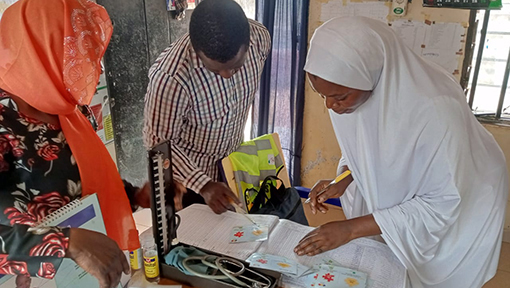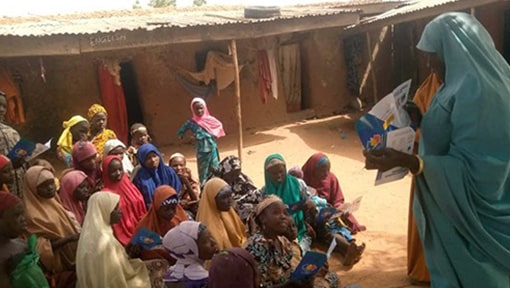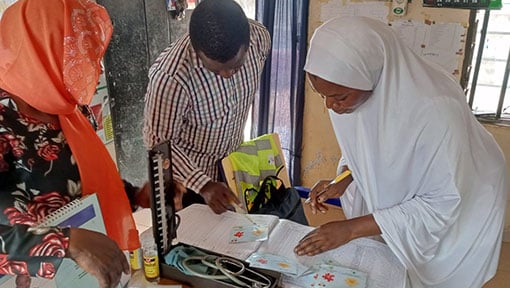TCIHC’s Fixed Day Static/Family Planning Day Approach Diffuses Statewide in Uttar Pradesh
Contributors: Samarendra Behera, Mukesh Sharma, Akbar Khan, Sachin Srinarain, Amardeep Kohli, Vivek Dwivedi and Deepti Mathur
 The state of Uttar Pradesh (UP) has issued a directive to designate one day a week for Antral diwas (translated as “Spacing Day”) to ensure quality family planning services at urban primary health centers (UPHCs). The UP government made this decision based on the impact that fixed day static/family planning days (FDS/FPD) for birth spacing methods – a proven approach from The Challenge Initiative for Healthy Cities (TCIHC) – has had in the 20 TCIHC-supported cities of UP since 2017. This decision means the approach is now being diffused to 75 districts for both urban and rural populations in the state.
The state of Uttar Pradesh (UP) has issued a directive to designate one day a week for Antral diwas (translated as “Spacing Day”) to ensure quality family planning services at urban primary health centers (UPHCs). The UP government made this decision based on the impact that fixed day static/family planning days (FDS/FPD) for birth spacing methods – a proven approach from The Challenge Initiative for Healthy Cities (TCIHC) – has had in the 20 TCIHC-supported cities of UP since 2017. This decision means the approach is now being diffused to 75 districts for both urban and rural populations in the state.
Two Chief Medical Officers (CMO) from TCIHC-supported cities in UP offer their thoughts below about statewide scale-up, as well as what the situation was like prior to TCIHC’s partnership and what changes contributed to increasing access and uptake of family planning services in their cities.
In comparison to FY2015-16, there is tremendous growth in reach and uptake of family planning services by Saharanpur’s urban poor population. In 2015-16, UPHCs existed but were not equipped to provide family planning services, except short-term methods (condoms and oral contraceptive pills), because there were no additional choices of methods available, such as intrauterine contraceptive device (IUCD), injectable contraceptive (Antara); neither were IUCD kits available; nor were urban ASHAs trained on how to counsel clients on family planning methods during their household visit. Since 2017, Saharanpur is receiving technical support from TCIHC. In order to ensure family planning services to urban poor population, TCIHC has developed high impact approach/best practice tools, with the help of which these best practices can be scaled up to cover large populations.
We took advantage of these tools, especially fixed day static/family planning day (FDS) approach. Initially, when we rolled out FDS, we faced some issues like absence of equipment, untrained providers, irregular supplies but we sorted them out, and, most importantly, potential clients of family planning services were identified and linked by ASHAs to UPHC as they received coaching from TCIHC. Now, FDS by its new name ‘Antral diwas’ is rolled out across ALL urban and rural PHCs (primary health centres). I believe this step will help the potential beneficiaries of family planning services and we will match the national average of family planning.”
The experience in Lucknow was similar to that of Saharanpur – even though the cities are quite unique from each other.
At present (2019-2020), Lucknow is providing family planning services through its entire system of 52 UPHCs and eight CHCs (community health centres), while five year ago [2015-2016] the situation was contrast. At that time, UPHCs existed but were not equipped to provide family planning services except short-term methods, condoms and oral contraceptive pills, because there were no additional methods, no IUCD kits and urban ASHAs were also not trained on family planning. The biggest factor contributing to the enormous change in family planning service uptake is because of the development of our UPHCs and urban CHCs. Over these years, the establishment, trained human resources, commodities and supplies have all improved. And, with the help of ASHA, the community has become confident and interested in services. All of these areas have contributed in advancing and improving the family planning program. Efforts were made to situate UPHCs in those locations, which could be easily accessed by urban poor populations. Also, trained ASHAs were posted in urban poor slums. As a result, young couples residing in urban poor slums were some of the major beneficiaries of the urban family planning program.
Throughout this journey, we had technical support of TCIHC who had experience in urban family planning, supported by evidence, and based on this experience, they developed simple tools, which helped us move forward. One of the tools was FDS. With the support of TCIHC, we rolled out FDS in a staggered manner across all our UPHCs and UCHCs and we received good results out of this. We initiated IUCD and Antara at these centres. Young couples benefited the most from these additional method options and, as a result, overall family planning users increased. ASHAs also played an instrumental role in this as their competency was enhanced on family planning client counselling due to TCIHC coaching and mentoring. Success of FDS was evident by the fact that government had to make budgetary provisions for FDS in cities supported by TCIHC. But, now, this has been expanded in the form of ‘Antral Diwas’ to all rural and urban PHCs across all 75 districts, which further illustrates not only the impact of the approach but government’s commitment to its sustainability.”






